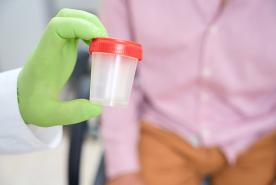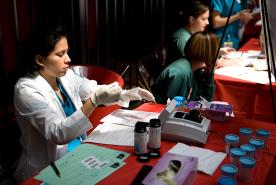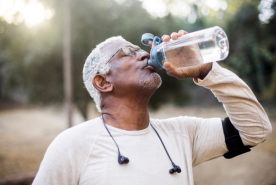October 15, 2024
Kidney disease is the 8th leading cause of death in the U.S. It causes more deaths each year than breast cancer or prostate cancer. For Hispanic/Latino Americans, the risk may be higher. Dr. Sylvia Rosas, President of the National Kidney Foundation, and Mario Ponce, a kidney recipient and transplant advocate, explain the health disparities that many Hispanics/Latinos face and share tips to keep kidneys healthy.
Identifying the Risks
Hispanic/Latinos have two times the incidence of kidney failure compared to other White persons.
"Hispanic/Latinos have a higher chance of having diabetes and high blood pressure. Those are the two main causes of chronic kidney disease," said Dr. Rosas. "One in four children in the United States is Hispanic. One in two Hispanics will have diabetes during their lifetime. The disproportion in the United States continues to grow."
This is not due to race or ethnicity. It's a combination of medical, environmental, and social factors called social determinants of health. These factors make living a healthy life more difficult.
"Latinos have less access to healthcare and healthcare insurance. Some face issues with immigration or language barriers. Others experience economic issues that can result in not taking medicines as prescribed or going to the doctors when we should. We also have a tendency to rely on home remedies," Dr. Rosas said. "Since kidney disease doesn't often show symptoms until they've failed, many don't know they have it until it's too late."
The best way to prevent a surprise diagnosis of kidney failure is to get tested.
"On dialysis, you're attached to a machine for 12 to 16 hours a week. That doesn't count time spent on transportation or waiting to get connected. Many dialysis patients don't feel well after treatment," said Dr. Rosas. "If detected early enough, there are steps you can take to avoid dialysis. Get your kidney checked if you have diabetes or high blood pressure, a family member who has kidney disease, are obese, or have cardiovascular disease."
Mario's own kidney disease journey began with vomiting and severe headaches.
"A urine test showed I had kidney disease. I learned I was born with a congenital condition called horseshoe kidney, where my kidneys connect at the base. My function gradually deteriorated," Mario said. "Soon after my diagnosis, my kidneys failed. I started dialysis and was forced to stop working and attending college. I dealt with financial barriers and limited resources during my time as a dialysis patient."
After a year on dialysis, Mario's mother gave him the gift of life. Sadly, the transplant rejected two years later. He spent the next decade on dialysis.
Take our one-minute quiz to learn if you are at risk of kidney disease.
Protecting Your Kidney Health
Kidney disease can be prevented and managed.
"If you are at risk, there are ways to prevent kidney disease. If you have kidney disease, you can control it. You don't have to expect dialysis or a transplant," said Dr. Rosas. "Go to www.kidney.org. On the right-hand side, click Recursos en Español. Here you can learn how the kidneys function and how you can protect them."
Protect your kidney health by:
- Knowing your risk: Diabetes and high blood pressure are the top two causes of kidney disease. Family history, being older, being obese, or having an inherited genetic disease.
- Getting regular checkups: Bring the results of your kidney quiz to a healthcare practitioner to get the conversation started. Ask what you can do to protect your kidneys.
- Taking medications as directed: Take prescribed medications as directed. Watch the use of NSAID pain medication, as it can damage the kidneys.
- Exercising: Regular exercise helps maintain healthy blood sugar, pressure, and weight.
- Eating healthier: Overly processed foods high in sodium and added sugars are linked to higher rates of kidney disease.
"Many of us, as immigrants or children of immigrants, have a purpose–to be successful and create a new life for our families. If we don't take care of ourselves, we can't achieve those goals," Mario said. "Health is the most important; without it you can't achieve anything."
Kidney Transplants
In 2015, Mario received a second transplant.
"I still take medications and have routine checkups but I got my health back," Mario said. "It gave me my life back. I was able to pursue my goals and achieve my dreams. I am a Health Business Administrator and professor, all thanks to two altruistic people."
While Mario received two kidney transplants, many aren't so lucky.
A 2024 observational study found that Hispanics/Latinos with kidney failure are less likely to be approved for kidney transplantation or receive one–especially from a living kidney donor.1
"There are many people who are on dialysis waiting for a transplant and unfortunately, they die waiting," Mario said. "You need to be healthy and take good care of yourself. Try to limit foods that could hurt you. There is so much to learn about the transplant process and requirements."
NKF is here to help, no matter what stage of kidney disease you're at.
- NKF Cares: Get your questions answered by a trained professional.
- NKF Peers: Match with a trained peer mentor who has experience living well with kidney disease.
- Kidney Learning Center: Find a free online course about kidney disease, transplants, and living kidney donation.
Knowledge is power! Start protecting your kidneys today. Find all NKF resources in Spanish.
Source
1Gordon, Elisa J. PhD, MPH1; Lee, Jungwha PhD, MPH2; Kang, Raymond MA3; Uriarte, Jefferson BS2; Caicedo, Juan Carlos MD4. Disparities Persist Among Hispanic Patients: Completing Evaluation, Waitlisting, and Receiving a Kidney Transplant. Transplantation Direct 10(3):p e1595, March 2024. | DOI: 10.1097/TXD.0000000000001595









